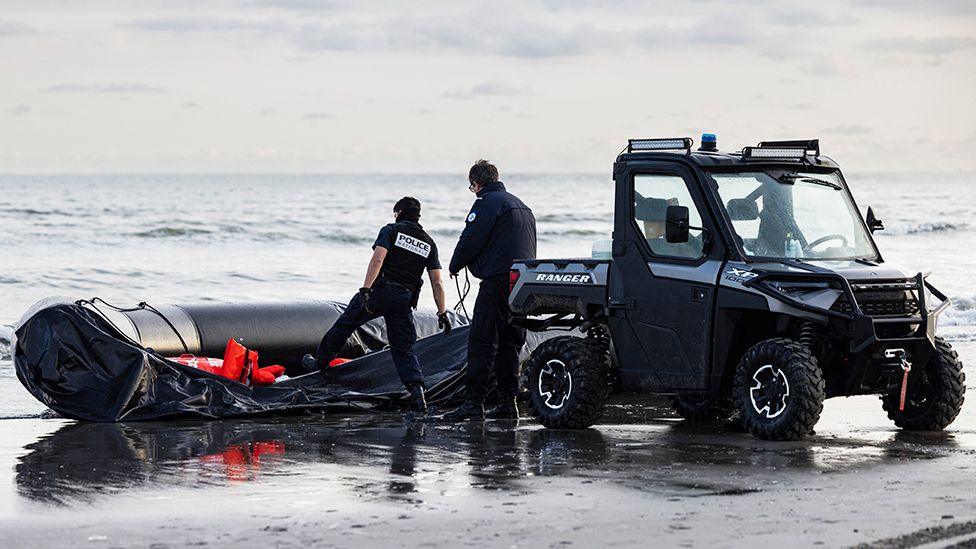Boat crossings will be part of how Labour is judged

French authorities are working with the British government to deploy more resources in tackling the issue
- Published
The bottom of the hugely crowded inflatable boat ripped and fell out, plunging people into the sea.
This, I am told, is what happened, early on Tuesday morning in the English Channel, with devastating consequence: at least 12 people dead, among them children and a pregnant woman.
People crossing the Channel in small boats is an issue at once human, moral, practical, political and diplomatic.
It is a crisis on the UK’s southern shores which governments of different political hues are failing to stop.
And currently there appears to be a frightening trend with deadly implications.
More people are cramming on to poorer quality boats with weak engines and are willing to travel in dangerous conditions.
The likelihood of tragedy is magnified.
It appears this could be a horrendous unintended consequence of attempts to smash the complex, international, organised criminal networks at the heart of these crossings.
A key part of the strategy for taking this on is what officials call "upstream solutions".
This has involved the government and the National Crime Agency attempting to break the business model of the smuggling gangs.
Key to this is to disrupt or ideally destroy the supply chains which they rely upon, not least the supply of boats and engines.
Fewer boats and fewer engines, it seems, now encounter ongoing vast demand to attempt a crossing – and so do so with more people in each boat, often with inadequate power to cross the busiest shipping lane in the world.
Then there is the diplomacy – in other words the relationship between the UK and France.
Privately, some in London think after recent political turbulence in France they are now dealing with a dysfunctional administration in Paris.
The French government, for its part, has suggested a migration treaty between the UK and the European Union and blamed Brexit for exacerbating problems.
Such a treaty appears highly unlikely.
The new home secretary, Yvette Cooper, has described this latest incident as “deeply tragic” and repeated her commitment to dismantling the smuggler gangs.
Her predecessor, James Cleverly, now her shadow and a Conservative leadership hopeful, said too it was a tragedy, and one that emphasised the need for a deterrent.
Twelve die after migrant boat sinks in Channel
- Published4 September 2024
Migrant crossings top 20,000 so far this year
- Published29 August 2024
Lifejacket mural tribute to migrants who died at sea
- Published25 August 2024
The Conservatives had wanted to send some migrants to Rwanda, but they never managed it and Labour have now scrapped the policy.
In the next few weeks, the government will appoint what it will call a Border Security Commander to take on what is becoming a defining issue of the 2020s.
Whether this government can successfully grapple with and ultimately stop thousands attempting to cross the English Channel in small boats is likely to play a major part in how they are judged in the coming years.
Solving this will be incredibly difficult and there is every prospect of yet more days where people perish in the waters between France and England.

Sign up for our Politics Essential newsletter to read top political analysis, gain insight from across the UK and stay up to speed with the big moments.
It’ll be delivered straight to your inbox every weekday.